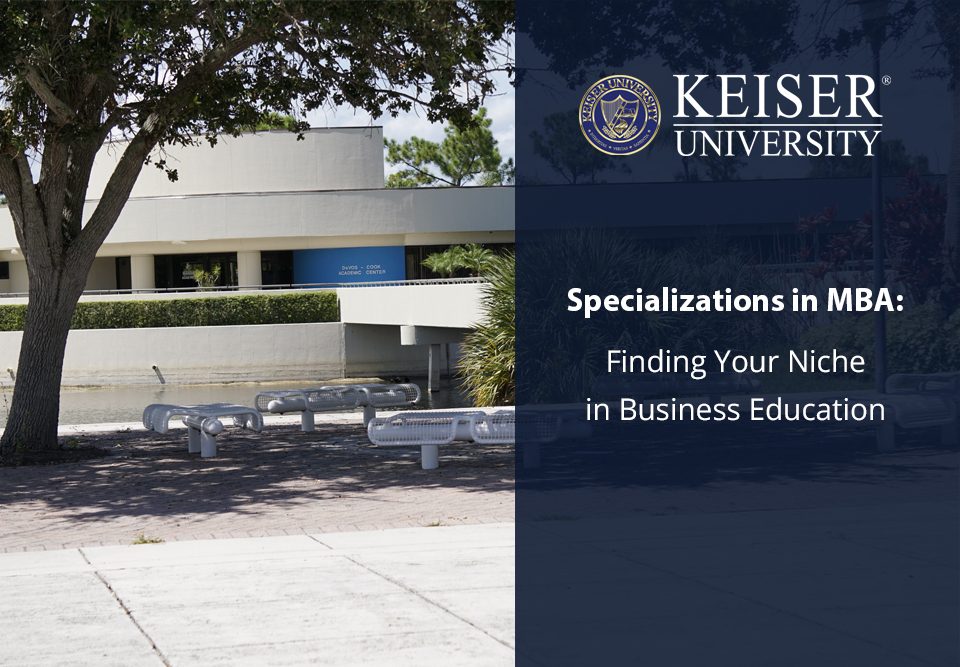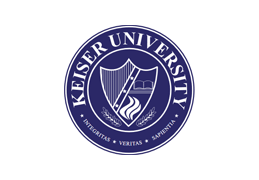Thinking about returning to school to complete your master’s in business administration (MBA)? If so, then one of the first things you may notice as you begin exploring MBA programs is that there are numerous specializations available. Having a specialized MBA can help you focus your studies on an area of business administration that most interests you — but selecting the right specialization for your career aspirations requires a lot of careful thought.
So, what are some things you should keep in mind as you choose an MBA specialization and how can the right specialization propel your career forward? Let’s explore.
How to Choose an MBA Specialization
In general, an MBA program is designed to provide students with the foundational knowledge and skills needed to take on a variety of leadership and or managerial roles within an organization. Likewise, an MBA program can also be useful for those interested in starting their own businesses but do not have strong business backgrounds.
While general MBA tracks can be sensible for some, numerous students will benefit from selecting a specialized MBA.
What Is an MBA Specialization?
A specialization, also commonly referred to as a concentration or track, refers to a program that focuses specifically on a certain area of business. Some common examples of MBA specializations include:
- Marketing
- Accounting
- Health Services Administration
- Technology Management
- Global Business
- Management
Typically, these programs include the same core classes as a general MBA program, along with more niche classes in the student’s chosen specialization.
Does MBA Specialization Matter?
When selecting an MBA program, you may find yourself wondering if having a specialization really matters. Ultimately, this will depend on several factors, including your own career aspirations and interests.
Importance of MBA Specializations
There are many reasons to consider an MBA specialization when you enroll in an advanced degree program. Most importantly, a concentration allows you to really focus your studies on areas of the business world that most interest you and will be most useful to you in your career.
For example, if you’re already working in healthcare and are interested in being promoted to a leadership or managerial role, then an MBA with a health services administration specialization may make the most sense. In this type of program, you’ll be able to specifically study areas of business related to healthcare administration and build upon these essential skills.
Having an MBA with a specialization can also make you a more competitive candidate when it comes time to apply for jobs in your field. Employers may prefer applicants who have specialized degrees and specific experience, and an MBA with a concentration can give you just that.
Types of MBA Specializations
The exact specializations available will ultimately depend on the school you are considering for your MBA program There are a myriad of different MBA specializations available, with some of the most common including:
- Real estate
- Technology
- Healthcare
- Entrepreneurship
- Marketing
- Global business
- Social impact
Assessing Career Goals and Interests
Now that you have a better understanding of what’s out there when it comes to MBA specializations, you may be wondering how you can go about choosing one to suit your career goals and interests. This will require you to take a step back and think about where you see yourself not only a couple of years from now, but several years down the road.
Additionally, consider your own interests in the field. Just because you’re currently working in one industry doesn’t necessarily mean you have to stay in that field. If you have dreams of starting your own business or pivoting to work in a different industry, this can be a great chance to make that happen by selecting a specialization that allows you to study another field.
Career Paths Aligned With MBA Specializations
So, what are some examples of the kinds of jobs you can do with different MBA specializations? For instance, those who specialize in health services administration may go on to work as health care consultants, managers and supervisors at hospitals and other healthcare facilities.
Meanwhile, those who pursue an MBA with a real estate specialization may go on to work as managers and associates at large real estate firms. Those who study accounting can explore careers as account directors, budget analysts and even chief financial officers.
With an MBA specialization in global business, graduates can work in such fulfilling careers as international financial manager, global economist, import compliance specialist and more.
Researching MBA Programs and Specialization Options
In addition to considering your own career goals and interests when exploring MBA programs with specializations, there are a couple of other steps you should take as you narrow down your options. This includes identifying programs that most appeal to you and taking the time to compare them side by side.
Identify MBA Programs of Interest
Not all schools and MBA programs are created equal, so be sure to explore your options among different schools (including online schools) that are reputable and accredited. While many graduate schools offer MBAs, not all will offer the same specializations and concentrations.
Ideally, you’ll be able to narrow down your list to a handful of options before moving onto the next step.
Compare MBA Program Offerings
Once you know which programs are the most appealing to you, it’s a good idea to sit down and compare them carefully. When comparing MBA program offerings, consider such factors as:
- Whether or not the school/program is accredited
- Format offerings (online, in-person, hybrid, etc.)
- Cost (including price per credit hour and additional fees)
- Time to completion
- Application/admission requirements
- Overall curriculum (including core classes and specialized classes)
Once you compare these important parts of each specialized MBA program, you should have an easier time determining which is right for your needs and which one(s) you will end up applying for.
Tailoring MBA Application and Essays
Whether you decide to apply to just one MBA program or a few to keep your options open, the process of completing graduate school applications can feel daunting. However, with a few basic tips and best practices in mind, applying to different MBA specializations doesn’t have to be too stressful or time-consuming.
Relevant Experiences, Skills and Achievements
Before you even get started with an application essay, take some time to list out your personal accomplishments, skills, achievements and other designations that may help you stand out from other applicants. This will give you a better place to start from when it comes to crafting those application essays to an MBA program. As you write, try to find specific ways to connect your skills and experiences to what you hope to get out of your MBA program.
When crafting application letters to an MBA program, always be sure to refer to the prompt. Different schools and programs may want you to cover different topics for your application letter, so you probably won’t be able to write a ‘one-size-fits-all’ application letter. Instead, each one will need to be tailored specifically to the prompt and program.
Resume Tips and Building for MBA Programs
Most MBA programs will also require you to submit a copy of your resume or curriculum vitae to be considered for admission. If this is the case, then it’s also a good idea to review and revise your resume before you submit your graduate school application.
When revising your resume for application to an MBA program, consider the specialization for which you are applying and try to include any relevant coursework or work experience that you have in that realm. Moreover, be sure that you include the program you attended for your undergraduate degree.
If you don’t have any relevant experience to list on your resume, you might consider taking on an internship or some level of freelance work before you apply to your desired MBA program. Even a small amount of experience added to your resume can help make you a better contender for admission.
Leveraging Networking and Alumni Connections
During your MBA program, you will have the opportunity to meet and connect with professionals from your field of study. This includes not just professors and fellow students, but guest speakers and other professionals as well. By taking advantage of these networking opportunities, you can build a stronger professional network that increases your own chances of success on the job market after graduation.
Connecting With Current Students, Alumni and Professionals
During your time in graduate school, put in the effort to establish and maintain professional connections with others in your field. This may include attending industry events (such as conferences) and forging connections on professional networking sites like LinkedIn.
Also consider that alumni can be an excellent source of potential job opportunities in your particular industry. Connecting with alumni from your MBA program can help you grow your network while also being a valuable source of guidance and advice.
Continuous Learning and Growth in Business
To find true success in the business world, no matter what industry you’re in, you’ll need to be committed to a lifetime of learning and growth. This means understanding that you are never done learning new things or acquiring new skills.
If you’re serious about pursuing your MBA and making the most out of your career, Keiser University is proud to offer a variety of online MBA specializations to suit your interests. This includes specializations in everything from accounting to management, marketing and health services administration. We also offer our MBA program in Spanish and Mandarin to meet our students’ diverse needs.
Learn more about our online MBA specializations by getting in touch with a graduate school admissions counselor today, or get started with your online application to our program!






 The instructors at Keiser University impacted my life. They believed in my ability to become a great graphic designer, regardless of how I felt about my skills. KU helped to prepare me for the real world and got me to where I am today.
The instructors at Keiser University impacted my life. They believed in my ability to become a great graphic designer, regardless of how I felt about my skills. KU helped to prepare me for the real world and got me to where I am today.
